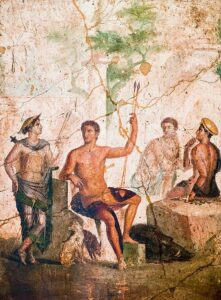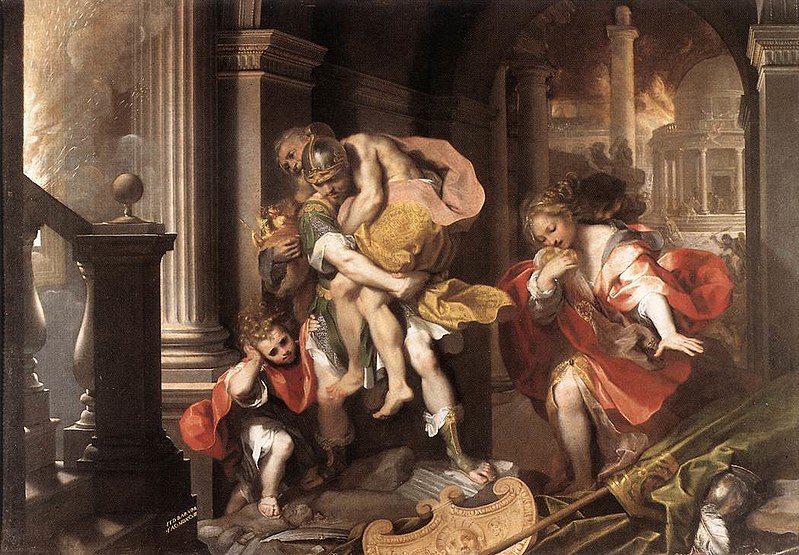 Online courses in Classical Latin
Online courses in Classical Latin
with George Sharpley
[email protected]
STARTING SEPTEMBER 2024
Weekly sessions are taught online, on Zoom.
Recordings of each session will be available for 3 weeks afterwards.
BEGINNERS
Tuesdays 6.30-7.45pm, 10 weeks starting Tuesday 24th September
The course we follow is my Complete Latin Course (see below). We’ll be reading snippets from ancient writers, whose voices weave a narrative of the history of Rome, starting with the early myths and legends, leading up to Rome’s emergence as a superpower in the Mediterranean. There will be lines of poetry too, which we will read aloud, so you understand and enjoy it! The language content assumes participants are beginners.
INTERMEDIATE
Mondays 6.30-7.45pm, 10 weeks starting Monday 23rd September
This course starts at Chapter 9 in The Complete Latin Course, with a revision of all the verbs. There will be readings from the coursebook as well as elsewhere; which cover the fascinating final moments of the Republic; Cleopatra; the death of Julius Caesar; the internal conflicts that continued; and the emergence of Augustus as ‘princeps’.
INTERMEDIATE PLUS
Wednesdays 6.30-7.45pm, 10 weeks starting Wednesday 25th September
We start at Chapter 15 of The Complete Latin Course, and Latin love poetry, with additional readings from Ovid and other poets. There is the added excitement of formally meeting the subjunctive!
Course details and fees
The course fee for 2024/5 is £98 for the 10 weeks.
Enrollers will be sent relevant bank details for payment of the fee (£98 for the 10 weeks). You will also need to purchase the coursebook, although PDFs will be available for the first two weeks on request.
To enrol or get more information, contact George ([email protected]).
Courses run for 10 weeks, starting in September and January.
 Course teacher: George Sharpley
Course teacher: George Sharpley
George is a former university teacher of Latin who has created a variety of learning materials and course-books. More recently he has been working on projects to bring the poetry of Virgil and Ovid to wider audiences. “I’ve worked in languages all my life, and Latin in particular. I am fascinated by the language and the culture around it. I am especially hooked on the poetry, which I try to share where I can. It’s ironic that a language which has not exactly been on many people’s lips these past two thousand years should stand out for the beauty of its voice.”

The Complete Latin Course
It is recommended you buy a new copy of The Complete Latin Course, as changes and corrections have been made to the first print of the second edition. The publisher, Routledge, offers a discount, HERE.
A PDF version of the first chapters of the book will be available for the first two weeks if you have not managed to secure a copy by the time the course starts.
Events
“Chasing Shadows”
A stage-play adapted from Ovid’s Metamorphoses
Click here for more
The Song of Arms and a Man (performance)

“A brilliant dramatisation – warm, witty, bloody and cruel – and a sensational performance.” Prof. Tim Whitmarsh (at Cambridge)
“The Song of Arms and a Man was an enthralling and unique dramatisation of Virgil’s Aeneid … very easy to follow regardless of how much or little Latin each person knew … I cannot recommend this performance enough.” Safa Malik, The Virgil Society Newsletter, May 2023 (at King’s College, London
“ Phenomenal. Lots of our students were in the audience – thank you for inspiring them. I was spellbound.” Guildford High School (at Charterhouse)
The Latin Qvarter’s presentation of Virgil’s Aeneid is read by Emma Kirkby, Matthew Hargreaves, Ben Cartlidge and Maria Roddis. George Sharpley’s adaptation of a rarely heard masterpiece echoes the ancient culture of public performance of poetry, and is accompanied with live ancient music by aulos-player Callum Armstrong. The performance brings the thrilling epic alive, telling the story of Aeneas’ struggle to fulfil his destiny as founder of Rome – from his escape from the burning ruins of Troy to his asylum and heart-breaking affair with the Carthaginian queen Dido and then his reluctant war with the inhabitants of his fated homeland of Italy. Selections of Virgil’s epic verse are read in the original Latin interspersed with an English narration which tells the whole story of the poem. This innovative and acclaimed presentation was first performed in Gloucester in 2018, and since at Bristol, Oxford, Charterhouse, Cambridge, King’s College London, and is coming to University College London (10th November 2023)